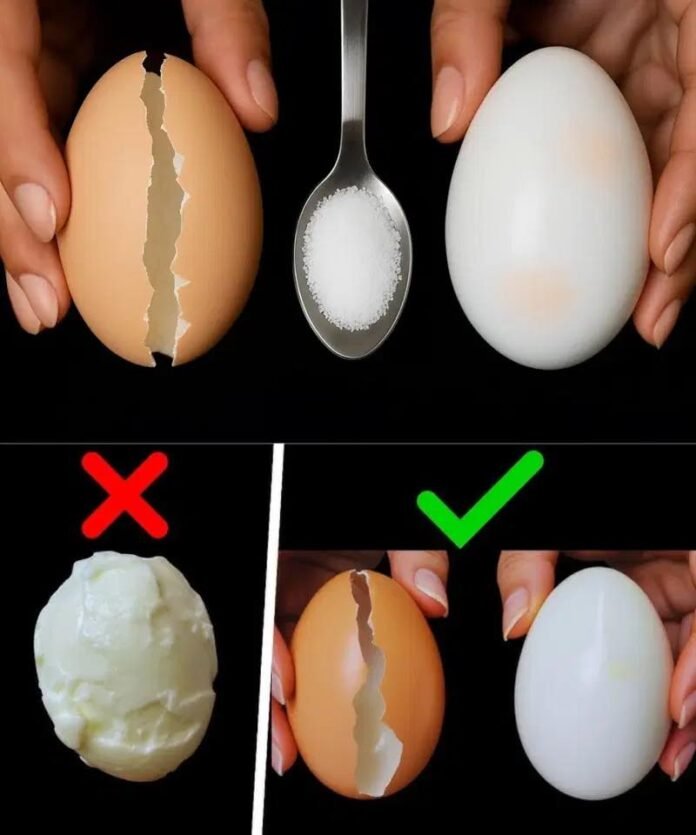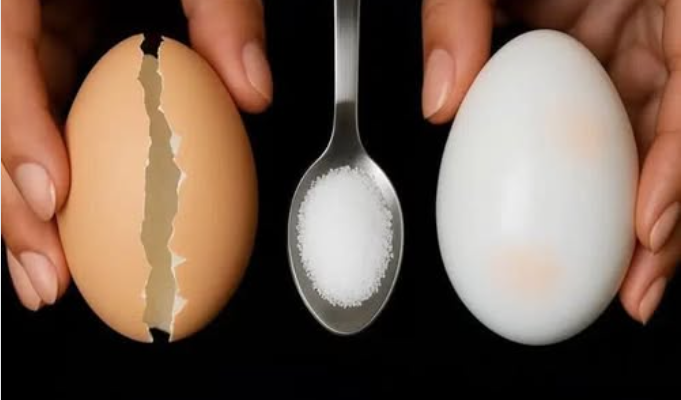The Secret to Perfect Eggs: How to Cook Like a Luxury Hotel Chef at Home
Eggs are one of life’s simplest and most satisfying pleasures. They’re affordable, packed with essential nutrients, and incredibly versatile. Whether scrambled for a quick breakfast, sliced into a fresh lunchtime salad, or softly poached atop a creamy bowl of ramen, eggs are always there—quietly reliable, endlessly adaptable, and deeply nourishing.
But have you ever wondered why the eggs served at high-end hotels and luxury resorts taste so much better than the ones you make at home? Their texture is softer, their flavor more refined, and their yolks glow with an almost surreal golden hue. They don’t just taste good—they taste elegant. Almost decadent.
The truth is, the difference rarely lies in the eggs themselves. The real secret is in how they’re cooked.

Why Most Home-Cooked Eggs Fall Short
For most home cooks, boiling eggs is a simple process: drop them in water, crank up the heat, and wait. But this “boil-and-hope” method often yields disappointing results:
-
The whites become rubbery and tough.
-
The yolks are dry and crumbly, sometimes with a gray-green ring around them caused by a sulfur–iron reaction.
-
The shells crack in the pot, leaking out bits of white.
-
And worst of all, the flavor stays flat and uninspiring.
Luxury hotels avoid these common pitfalls. Their chefs treat eggs with the same care and precision they would offer to a filet mignon or a delicate soufflé. Because eggs, when treated well, can be just as luxurious.
Here’s how you can bring that hotel-level finesse into your home kitchen.
The Secrets of Hotel-Style Egg Perfection
1. Simmer, Don’t Boil
The most common mistake? Boiling too hard. A rolling boil tosses eggs around violently, increasing the chances of cracked shells and uneven cooking. It also toughens the whites, making them chewy instead of tender.
What chefs do instead:
They maintain a gentle simmer—keeping the water temperature between 185°F and 194°F. This gentle heat cooks the egg evenly, giving you a tender white and a perfectly set yolk without overcooking.
Try this method at home:
-
Place your eggs in a saucepan and cover with cold water.
-
Heat slowly until the water reaches a gentle simmer—look for tiny bubbles, not a full boil.
-
Cook for 7–8 minutes for a medium-set yolk, or 9–10 for a firmer center.
-
Immediately transfer to an ice bath (more on that below).
2. Add Salt and Vinegar to the Water
Hotel chefs often season the water when cooking eggs. It might sound trivial, but it serves multiple important purposes:
-
Salt helps strengthen the eggshell, reducing the risk of cracking.
-
Vinegar (usually white vinegar) helps the egg white coagulate quickly. This is especially helpful if there’s a small crack in the shell—it prevents the white from leaking out.
For a standard saucepan, try adding about 1 tablespoon of vinegar and 1 teaspoon of salt to the cooking water.
3. Always Use an Ice Bath
This step is non-negotiable in professional kitchens.
As soon as the eggs are done cooking, transfer them to a bowl of ice water. This stops the cooking process instantly and locks in the texture and color.
Why it matters:
-
Prevents overcooking, which can cause dry yolks and gray rings.
-
Helps maintain vibrant yellow-orange yolks that look beautiful on the plate.
-
Makes peeling the eggs much easier, as the cooling contracts the egg inside the shell.
Let your eggs sit in the ice bath for at least 5 minutes. If you’re making them ahead of time, you can even store them in the cold water until you’re ready to peel.
4. Try Steaming Instead of Boiling
This is a lesser-known technique that’s quickly becoming popular in high-end kitchens. Steaming eggs is incredibly gentle, consistent, and reliable.
How to steam eggs at home:
-
Place eggs in a steamer basket over a pot of simmering water.
-
Cover and steam for 10–12 minutes, depending on your desired doneness.
-
Finish with an ice bath.
Steamed eggs are often easier to peel and have a smoother, silkier texture than traditionally boiled eggs. The even heat ensures a consistent result every time.
5. Sous Vide: The Ultimate Egg Luxury
The sous vide method, used in many gourmet kitchens, allows chefs to cook eggs at a very precise temperature in a water bath. The result is unparalleled: tender, silky whites and luscious, custard-like yolks.
At home:
If you have a sous vide machine, set it to 145°F–149°F and cook whole eggs (in the shell) for 40–45 minutes. If you don’t have the equipment, you can mimic the technique by maintaining a steady water temperature on the stove, though this takes a bit of practice.
The payoff is a unique texture that’s unlike any other method—perfect for eggs on toast, ramen bowls, or even a luxurious eggs Benedict.
Extra Tips from the Chef’s Playbook
Beyond cooking techniques, five-star chefs pay close attention to the details:
-
Start with room temperature eggs. Cold eggs are more likely to crack when added to hot water. Let them sit out for 10–15 minutes before cooking.
-
Use the best eggs you can find. Fresh, organic, pasture-raised eggs have richer flavor, firmer whites, and vibrant yolks.
-
Oil the shells for presentation. A small touch of oil on the shell gives boiled eggs a glossy, beautiful finish when served unpeeled—perfect for brunch or a special occasion.
Why This Matters—for Everyone
Cooking eggs with care isn’t just about taste. It’s also about health and enjoyment.
For seniors, eggs are an ideal food—easy to chew, gentle on the stomach, and full of protein and essential nutrients. But undercooked or poorly handled eggs can pose a food safety risk. Hotel-style methods ensure eggs are thoroughly but gently cooked, reducing that risk while enhancing texture and flavor.
And for families, a beautifully prepared egg at breakfast can turn an ordinary morning into a cherished moment. It’s comfort food at its best—simple, satisfying, and made with love.
Final Thoughts: Bringing Hotel Luxury to Your Kitchen
You don’t need a culinary degree or a trip to a five-star resort to enjoy eggs that taste like they came from a Michelin-starred kitchen. All you need is a little extra care and attention to detail.
-
Simmer, don’t boil.
-
Add salt and vinegar.
-
Finish with an ice bath.
-
Try steaming or even sous vide for next-level results.
These small changes make a world of difference. Suddenly, your morning eggs become something special—creamy, tender, flavorful, and unforgettable.
So the next time you reach for that humble carton of eggs, think like a hotel chef. Because even the simplest foods, when cooked with intention, can become extraordinary.



